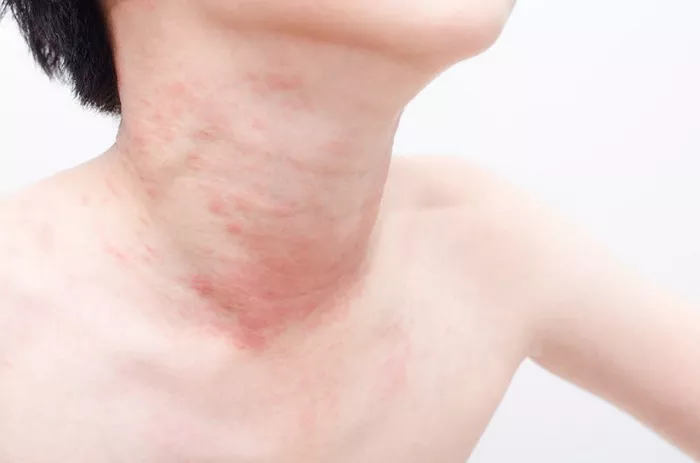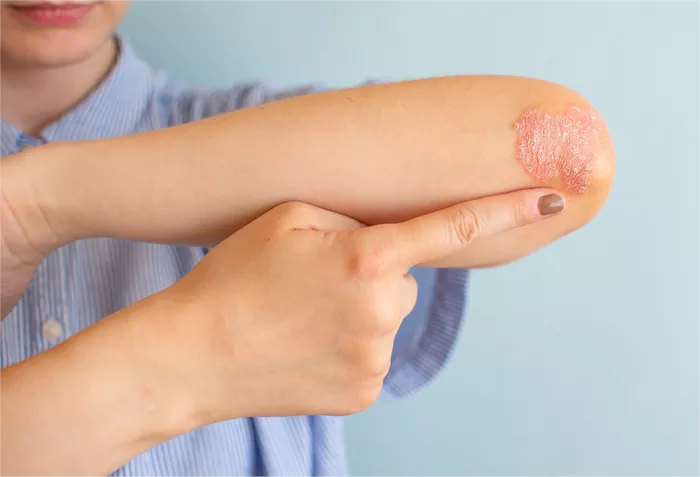Hives, also known as urticaria, can be an uncomfortable and frustrating skin condition characterized by red, raised welts or bumps that appear suddenly on the skin. The urge to scratch these hives can be strong, but it’s important to understand why scratching can exacerbate the condition rather than providing relief.
Understanding Hives
Hives are typically triggered by an immune response that causes small blood vessels to leak fluid into the skin, leading to the characteristic red, itchy welts. This response can be triggered by various factors, including:
- Allergens: Common allergens like certain foods, medications, insect stings, or pollen.
- Medications: Some medications, particularly antibiotics and pain relievers, can cause hives as a side effect.
- Infections: Viral or bacterial infections can sometimes lead to hives.
- Physical triggers: Factors such as pressure on the skin (from tight clothing or scratching), exposure to sunlight (solar urticaria), or exercise-induced urticaria.
The Itch-Scratch Cycle
When hives appear and begin to itch, the natural response is to scratch the affected area. However, scratching hives can lead to several negative consequences, perpetuating a cycle known as the itch-scratch cycle:
- Increased Inflammation: Scratching causes physical irritation to the skin, leading to increased inflammation and redness around the hives.
- Release of Histamine: Scratching hives can trigger the release of more histamine from the body’s immune cells. Histamine is a key player in allergic reactions and contributes to itchiness.
- Spread of Hives: Scratching can spread the hives to adjacent areas of skin, creating a larger rash and increasing discomfort.
- Risk of Infection: Intense scratching can break the skin, opening it to potential infection, which can further complicate the healing process.
Why Scratching Doesn’t Help
Although scratching temporarily relieves the itch sensation, it ultimately worsens the condition by intensifying the immune response and causing more inflammation. Here are some key reasons why scratching is counterproductive when dealing with hives:
- Histamine Release: When you scratch an itchy area, you stimulate the release of more histamine, amplifying the itchiness and redness of the hives.
- Trauma to Skin: The act of scratching can damage the skin, making it more vulnerable to infection and potentially causing the hives to last longer.
- Delayed Healing: Scratching delays the healing process by perpetuating the inflammatory response, making it more difficult for the body to resolve the hives naturally.
- Risk of Scarring: Persistent scratching can lead to scarring or permanent changes in the skin texture, especially if the hives are chronic or recurrent.
Strategies to Manage Hives without Scratching
Managing hives effectively requires breaking the itch-scratch cycle and finding alternative methods to alleviate discomfort:
- Antihistamines: Over-the-counter or prescription antihistamines can help reduce the itch and inflammation associated with hives.
- Topical Treatments: Calamine lotion or anti-itch creams containing ingredients like menthol or camphor can provide temporary relief without exacerbating the hives.
- Cool Compresses: Applying a cool, damp cloth or ice pack to the affected area can soothe the itch and reduce inflammation.
- Avoid Triggers: Identify and avoid triggers that cause hives, such as certain foods, medications, or environmental factors.
- Stress Management: Stress can exacerbate hives, so practicing relaxation techniques like yoga, meditation, or deep breathing exercises can be beneficial.
When to Seek Medical Attention
While most cases of hives can be managed with over-the-counter treatments and lifestyle modifications, it’s important to seek medical attention if:
- Hives persist for more than a few days
- They are accompanied by difficulty breathing, swelling of the lips or tongue, or other signs of a severe allergic reaction
- They are causing significant discomfort or interference with daily activities
A healthcare professional can provide additional guidance and prescribe stronger medications if necessary to help manage chronic or severe cases of hives.
Conclusion
In summary, scratching hives may provide temporary relief but ultimately worsens the condition by intensifying inflammation, spreading the rash, and delaying healing. Breaking the itch-scratch cycle through alternative strategies like antihistamines, topical treatments, and stress management is key to effectively managing hives and promoting skin health. If hives persist or become severe, consulting a healthcare provider is recommended to explore further treatment options and ensure optimal management of the condition.
Related Topics:

























